PRINCETON, NJ -- One reason John McCain has taken a modest lead over Barack Obama among registered voters nationally may be his ability to share the mantle of "change agent." More than half of Americans now see each candidate as potentially effective in changing the way the government works in Washington. At the same time, about two in three see each as potentially effective in addressing problems in the U.S. economy.
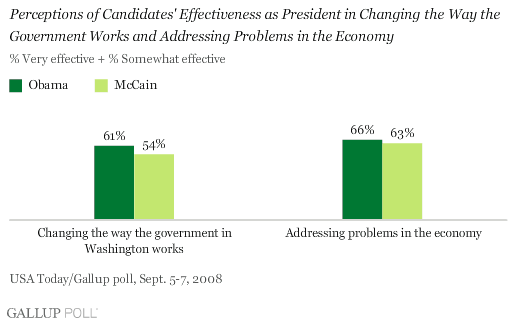
Independents See Both Candidates as Change Agents
One of the disadvantages of incumbency is that the challenger can wear the mantle of "change agent." Of course, there is no incumbent in the current election, but John McCain is the candidate of the incumbent party, and the Obama campaign has been attempting to link McCain to President George W. Bush. At this point, as seen in the accompanying graph, it appears that one successful outcome of the Republican National Convention and the selection of Sarah Palin as McCain's running mate has been to allow McCain to become surprisingly competitive with Obama in Americans' perceptions of not only his ability to change the way government works in Washington, but also his capability to address U.S. economic problems.
McCain emphasized his independence in his acceptance speech, and his choice of the anti-establishment Palin helps to reinforce that image. The Obama campaign has attempted to corner the market on change given Obama's status as a relative newcomer to Washington and his policy differences with the Bush administration. He has also sought to link McCain to Bush's policies.
Partisans largely buy this argument, with Democrats dubious about McCain's ability to deliver change and Republicans likewise doubtful Obama could. But 59% of independents say Obama would be effective in bringing about change while 52% say the same for McCain.
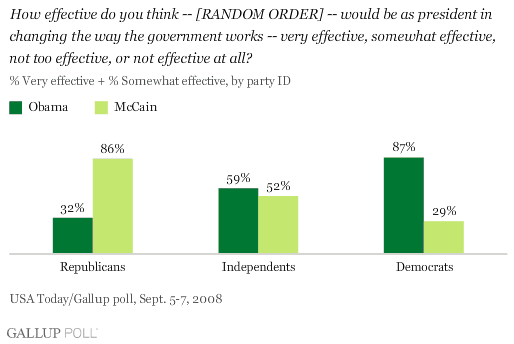
More than two in three independents think Obama and McCain would be effective at addressing today's domestic economic problems. Republicans and Democrats not surprisingly have much more faith in their own party's candidate.
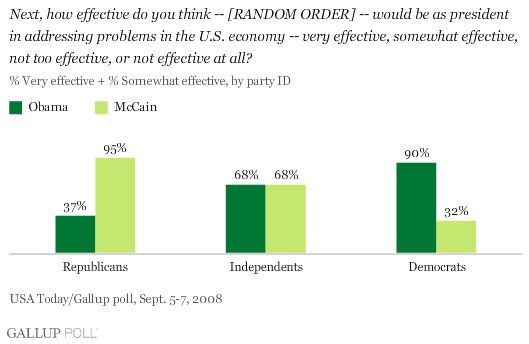
Americans of All Incomes See Both Candidates as Change Agents
In terms of how effective each candidate would be at changing the way Washington works, Obama ties McCain among upper-income Americans, but leads him by 10 to 14 points among those with middle and lower incomes.
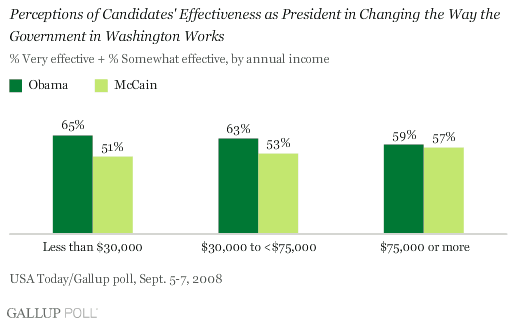
McCain has a slight edge over Obama among upper-income Americans when asked who would be effective at addressing today's domestic economic problems, while Obama edges McCain among middle- and lower-income Americans.
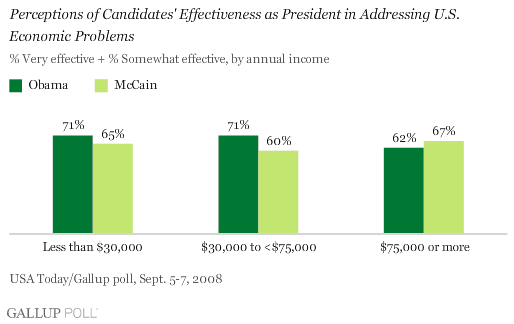
Commentary
While McCain wears the incumbent party label, he also shares to a large degree the "change agent" mantle, at least in the immediate aftermath of his party's convention. Whether he can maintain this important perception over the next eight weeks remains to be seen.
In this regard, the recent bailout of Fannie Mae and Freddie Mac may reveal the kind of change agents the candidates will be, because they clearly will face this as a major issue shortly after they take office -- much as the first President Bush did with the Savings & Loan crisis back in 1989. By creating a conservatorship for these companies, the Treasury has delayed decisions on their ultimate structure so the next administration and Congress can deal with them.
Both Obama and McCain have publicly supported the takeover and conservatorship of these two government-sponsored enterprises (GSEs). Both have also stated that the pre-conservatorship quasi-government status of these entities does not make sense.
What happens to Fannie Mae and Freddie Mac has profound implications for the future of housing finance, the ending of the current financial crisis, and more broadly for the recovery of the U.S. economy in 2009 and beyond. Their special status as quasi-government agencies before their conservatorship raises a wide range of issues concerning how the economy functions and how gains and losses are shared between the public and the private sector.
McCain's idea for change in addressing this major economic problem is to break up these two companies into several smaller entities, as suggested by former Federal Reserve Board Chairman Greenspan. The idea would be to remove the federal government to a greater degree from the housing finance system. It should be noted that the U.S. economy had a well-functioning housing finance system prior to the rapid expansion of loans and guarantees that were readily available from these two GSEs.
On the other hand, Obama has suggested a more lasting federal government involvement. He is concerned that the entities serve an important affordable housing role not served by any other federal agencies. He argues that the complexity of the issues deserves study but must clarify the public versus private status of these companies.
In sum, both candidates support change to address this important economic problem. What kind of change Americans want -- as illustrated by the potential future structure of housing finance in America -- may well play a significant role in determining who is elected in November.
Survey Methods
Results are based on telephone interviews with 1,022 national adults, aged 18 and older, conducted Sept. 5-7, 2008. For results based on the total sample of national adults, one can say with 95% confidence that the maximum margin of sampling error is ±3 percentage points.
Interviews are conducted with respondents on land-line telephones (for respondents with a land-line telephone) and cellular phones (for respondents who are cell-phone only).
In addition to sampling error, question wording and practical difficulties in conducting surveys can introduce error or bias into the findings of public opinion polls.
To provide feedback or suggestions about how to improve Gallup.com, please e-mail feedback@gallup.com.
